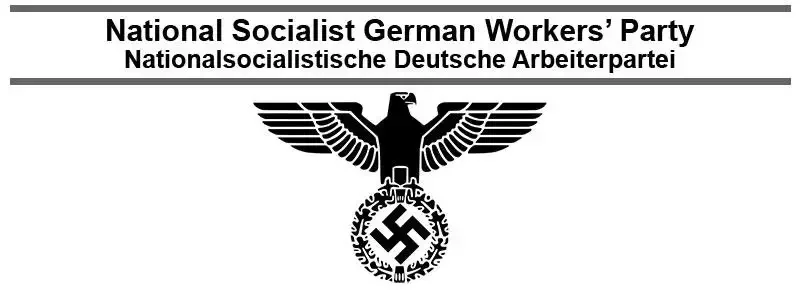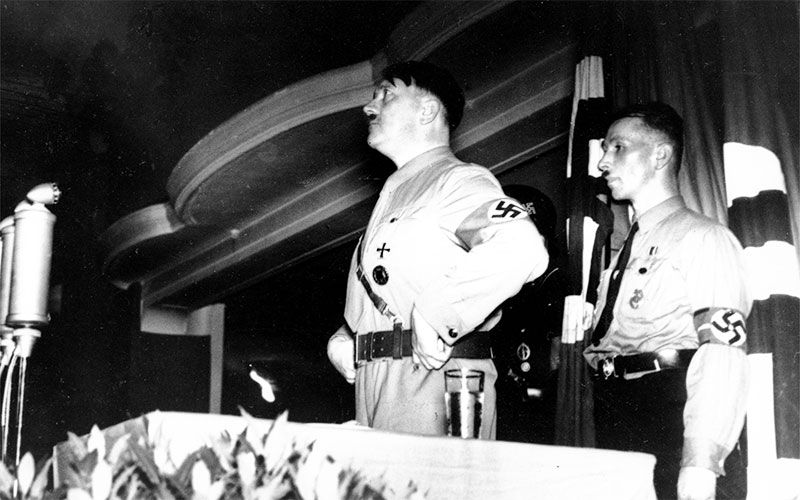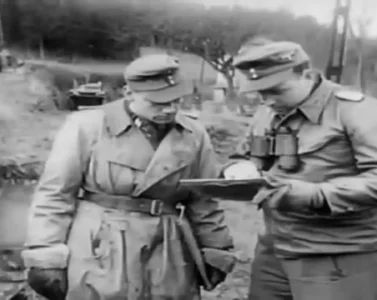- Military History
- Agencies, Organizations & Political Parties
- National Socialist German Workers' Party (1918)

National Socialist German Workers' Party (1918) Better known in English as the Nazi Party (NSDAP)
The National Socialist German Workers' Party (Nationalsozialistische Deutsche Arbeiterpartei – in German) is also known by its abbreviation NSDAP. On the 7th of March 1918, Anton Drexler, a Munich locksmith, established a Committee of Independent Workers in order to develop a nationalist viewpoint among working-class Germans. This led to the founding in January 1919 of the German Workers' Party, which Drexler set up along with a journalist Karl Harrer. Activity was confined to beer-hall discussions and membership was sparse when Adolf Hitler, then an instructor in the political department of the Army's Munich District Command, was sent to observe one of the party's meetings.
During the meeting (September 12, 1919) he became enraged by a suggestion that Bavaria should separate from the Reich and spoke so vehemently that he was invited to meet the organizing committee, made up of six men. Hitler became the committee's seventh member and a speaker for the group, taking charge of the party's propaganda in 1920. Trying out his capacity as an orator and agitator, he held some 2,000 people spellbound at a meeting on the 24 of February. In effect, Hitler was to take over the organization of this obscure and ill-defined political group, he ousted his associates and renamed the party the National Socialist German Workers' Party, or Nazi Party, at the same time resigning from the Army and devoting himself to full-time political activity.
He issued an initial 25-point program along strongly nationalist lines. A parallel movement had also developed in Vienna and in the Sudetenland, the Viennese being the first to use the swastika (Hakenkreuz), in 1918. The movements did not join at this stage, but kept in touch.
Meanwhile, in Munich, the party developed in some strength, aided by an Army officer with Free Corps connections, Captain Ernst Röhm. Former Free Corps men joined the party in some numbers, forming strong-arm groups (the Sturmabteilung or better known as SA) to protect their political meetings. The party acquired its own newspaper, the Völkischer Beobachter (the name means "People's Observer" whereby "people's" having some undertone of racial orientation), with secret financial aid from the Army and from Dietrich Eckart, a nationalist writer who became editor.
In July 1921, Hitler became the elected president of the party. The socialist element in the party program was bogus, a trick to win support from the working class, though Hitler wanted support from all sections of society.
Other early recruits to party membership were the former Army officers Rudolf Hess and Hermann Göring. The party attracted financial support from certain wealthy right-wing families into whose homes Hitler was invited as a rising star in politics. He also formed an association with the violently nationalist General Ludendorff. This connection encouraged him to stage the unsuccessful Munich Putsch of November 1923. This coup aimed at ousting the Bavarian state government to overthrow the republican government in Berlin.
Both the party and the Völkischer Beobachter were in consequence banned and Hitler was arrested. He resigned from the party leadership for the duration of his confinement in Landsberg Prison, though he used his trial to enhance his personal position as a national political figure. His year's incarceration during 1924 in Landsberg led to the party's temporary disintegration, though in any case it was illegal. It had to be totally reorganized by Hitler in 1925, following his release: "I shall need five years before the movement is on top again", he said.
Hitler also assumed leadership of the Austrian Nazi Party at this stage (1926). In Germany a system of party gauleiters was set up throughout the country to organize meetings and rallies and conduct propaganda. Joseph Goebbels was made gauleiter of Berlin in 1926. Party headquarters were established in the Brown House in Munich, and a succession of rallies were held in Weimar (1926) and in Nuremberg (1927, 1929 and 1933), growing in strength and becoming annual during the mid-1930s. Other annual events included the rally of party veterans in November at the Bürgerbraükeller in Munich to commemorate the 1923 putsch.
The years 1925 to 1931 were the years of Hitler's success in the often difficult and frustrating task of rebuilding the party. His policy now was to achieve power through "legal" means, by manipulation of the Constitution. His platform was based mainly on hostility to the Weimar government, to the Versailles treaty and to the Marxists, whom Hitler chose to identify with the Jews.
He increased the party's share of the national vote out of all recognition between 1928 and July 1932. Party membership rose between 1925 and 1929 from 27,000 to 178,000 and the Nazis hotly contested elections on the federal, state and municipal levels, with accumulating success from 1930. But their success in the Reichstag elections was phenomenal, going from 810,000 votes in 1928 to almost 13.75 million in July 1932. In the subsequent election (November 1932), however, the Nazis lost ground, their vote dropping by some 2 million and the number of their deputies correspondingly reduced from 230 to 196.
Their success had in fact been closely related to the rise of unemployment - in November the economic recession was ending. Hitler, as party leader, also contested the presidency against Hindenburg in 1932, losing the election but nonetheless achieving 13.4 million votes. With hectic maneuvering behind the scenes, playing off the successive chancellors, Papen and Schleicher, against each other, Hitler won the Chancellorship and pushed the party vote up to 17.3 million in the Reichstag election of March 5, 1933.
Following the Reichstag Fire of February 27, most of the Communist deputies and his key opponents among the Social Democrats had been ousted, and the Enabling Act, making him a dictator who could rule by decree, was passed on March 24, 1933. In the last free vote cast by the German electorate, therefore, Hitler achieved 6 million additional votes, representing support by 44 percent of the electorate. By a decree of July 14, 1933, the Nazi Party was constituted the only political party in Germany.

Thereafter, the organization of the party and the state gradually merged, with Hitler ruling by decree. Hess became deputy head of the party (and in effect its controller on Hitler's behalf, with Martin Bormann as his principal aide). On the death of President von Hindenburg, Hitler made himself Führer, Chancellor and Commander-in-Chief of the Army, as well as leader of the party in a one-party system. The party kept its identity throughout the regime, with all those occupying key positions, however minor (such as civil servants and teachers), required to be party members. The gauleiters, as district party representatives, were powerful figures until the end of the war. Hitler, in his will, left the party leadership to Bormann, who held this office technically during the last hours of the Nazi Reich.
National Socialist German Workers' Party (1918) - Quick Facts
- German Empire (1866-1918)
- Germany - Weimar Republic (1919-33)
- Germany Nazi (1933-1945)
- WWI (1914-1918)
- Weimar Republic (1918-1933)
- WWII (1939-1945)
- {{#owner}}
- {{#url}} {{#avatarSrc}}
{{name}} {{/url}} {{^url}} {{#avatar}} {{& avatar}} {{/avatar}} {{name}} {{/url}} - {{/owner}} {{#created}}
- {{created}} {{/created}}























